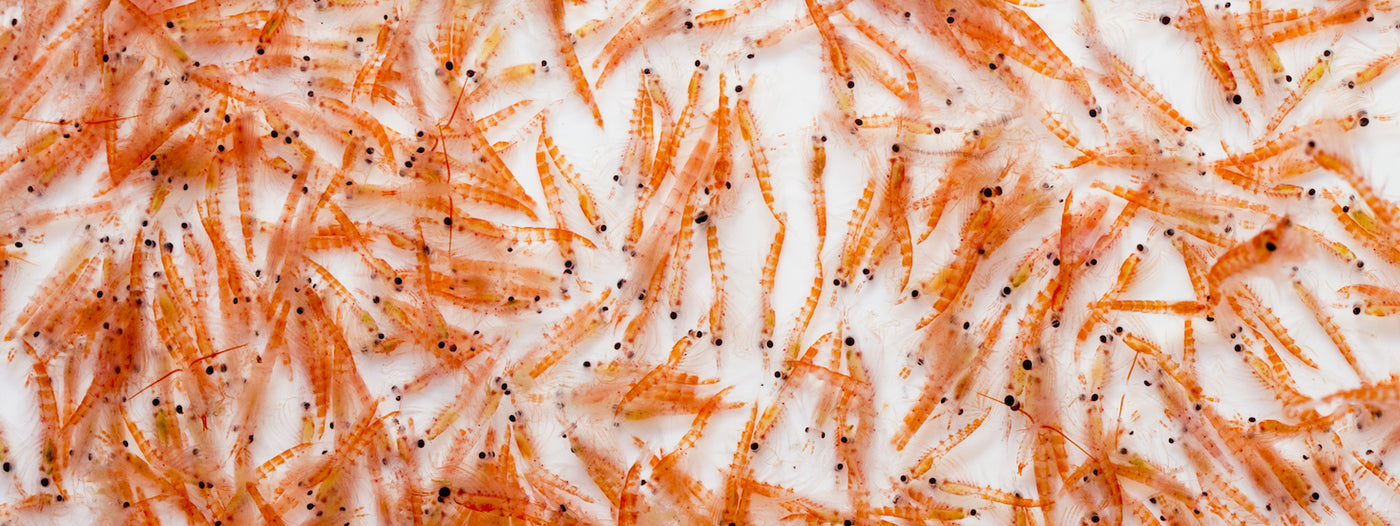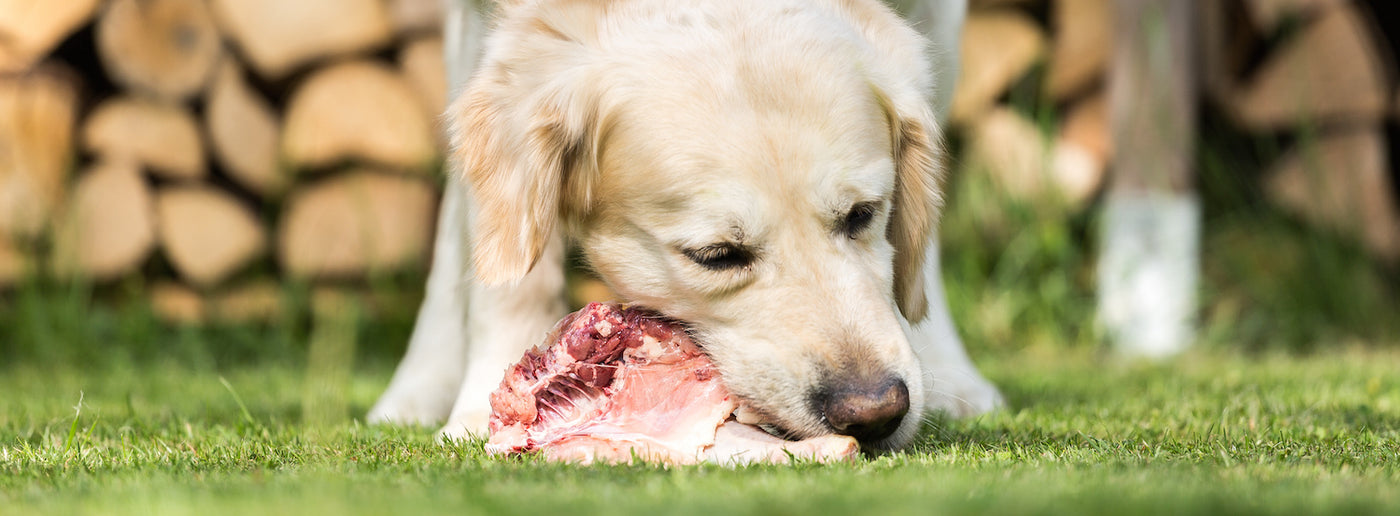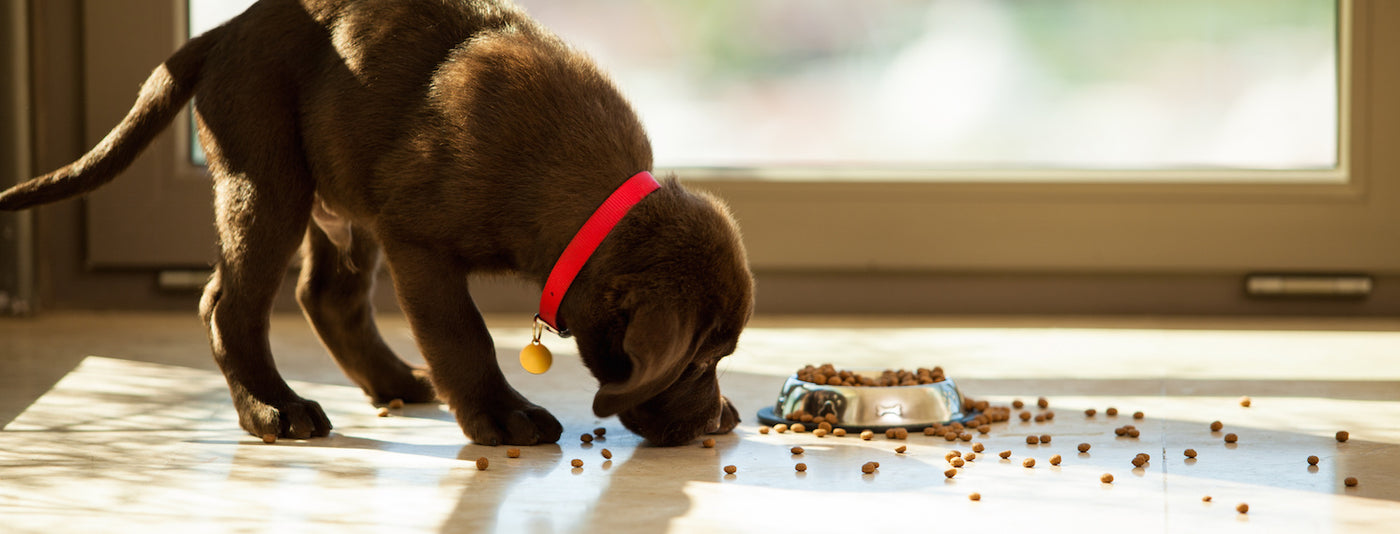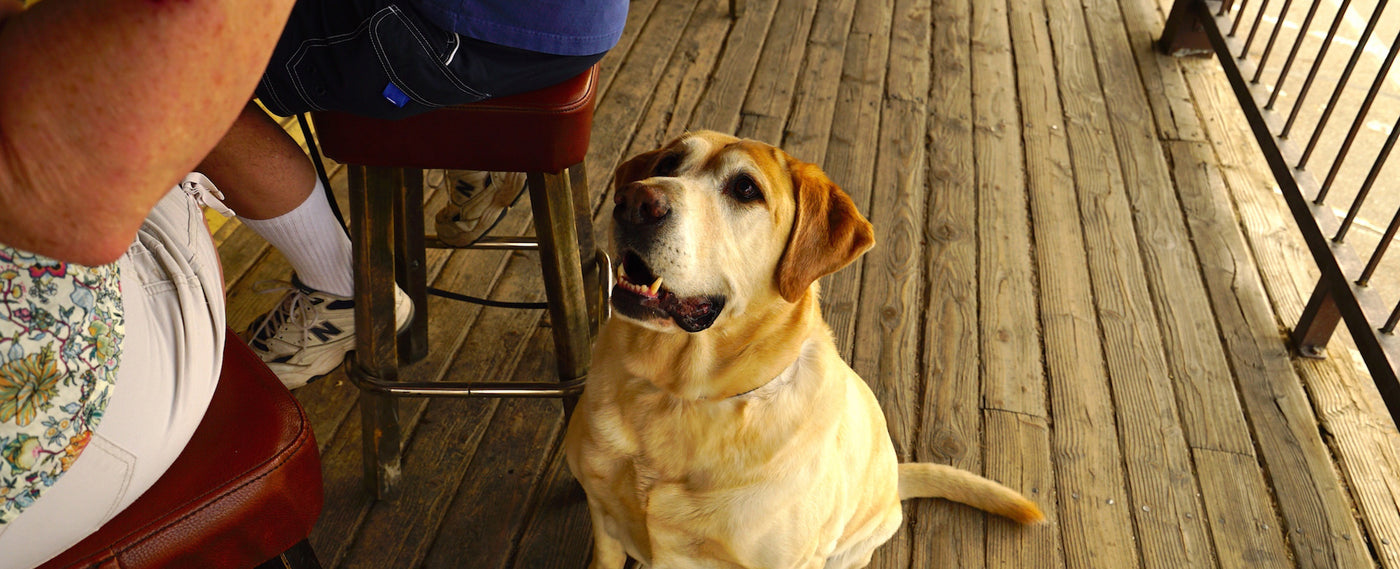
4 reasons to introduce krill to your dog’s diet
Ever wondered how the world’s largest mammal is able to survive on krill alone? That’s because Krill, is in actual fact a superfood - and one that is perfectly suited to man’s best friend.
For those needing a little convincing on introducing shellfish to your dog’s diet, we’ve listed 4 very convincing reasons that are worth considering before dismissing this quite substantial superfood.
- Krill oil contains more digestible omega-3 fatty acids than any other fish oil. While helping to maintain the elasticity of cells, omega-3 is also well known for reducing inflammation and lowering high blood lipid levels.
- Krill provides quality protein, as well as numerous vitamins, micronutrients, amino acids and minerals (from A to zinc).
- Krill contains glucosamine - an important component for the healthy growth, development and maintenance of cartilage tissue and joints.
- Krill contains a high quantity of astaxanthin, a natural carotenoid similar to that found in carrots and tomatoes. Astaxanthin is actually responsible for fighting free radicals in the body that cause cells to age and weaken the immune system.
Step away from the high-street brands
It’s important, as a dog owner, to remember that the dog foods available on supermarket shelves aren’t the only options available. In fact, many of these products aren’t satisfying your dog’s nutritional needs - you only have to investigate the ingredients label to confirm this.
However, we’re continuously searching for brands that are heavily committed to producing quality, nutritional dog foods capable of keeping our furry companions in optimum health. The newest brand introduced to our product range is Belcando - an innovative provider of quality, forward-thinking foods containing everything your dog could possibly need, and more.
You'll also be pleased to learn that Belando specialises in food for dog's of all ages, regardless of sensitivities. Shop the full Belcando range here today.
- Ben Abimbola
- Tags: Dog Diet Dog Food Dog Health Dog Nutrition Krill

How to tell if your dog is allergic to their food
It can often be difficult to pinpoint whether your dog is allergic to a certain ingredient in their food or whether the symptoms they’re experiencing are from something else i.e. the environment., If however, your dog is experiencing some unpleasant and prolonged symptoms that don’t seem to be budging, your vet will be able to run some tests to get to the exact route of the problem. It’s often helpful to know which symptoms to look out for, so we’ve listed the main ones below.
Symptoms to look out for:
- Upset stomach; wind, diarrhoea and/or vomiting
- Unhealthy skin; this could be flaky and dry, itchy or even oozing
- Unhealthy coat; patchy and/or bare in places or even dry
- Frequent sneezing or a runny nose
- Irritating ears, nose or eyes
- Swollen, irritable feet that they regularly lick or bite
Caring for a dog with food allergies
While some dogs are allergic to certain meat types, others are allergic to grains. We’d usually advise seeking vet advice prior to switching foods, however if the vet is unable to pinpoint exactly what ingredient they’re allergic to, the next best option is to try different food types and closely monitor your dogs reaction. If certain meats aggregate them, switch to a new one. If it’s the grains, switch to grain-free. There’s plenty of foods especially catered to dogs with allergies, from Imperial Food, through to Smolke. Many of our customers opt for hypoallergenic foods, avoiding things like wheat, soy, corn, additives and other problem-causing ingredients.
What if it's the environment?
Sadly, if your dog is allergic to something in the environment, its just a case of managing his or her symptoms. The best thing to do would be to bathe him/her every couple of weeks with a medicated shampoo, which will help to relieve the discomfort they may be in.
Foods we recommend for dogs with allergies or sensitive digestion:
- Smolke Grain-Free for adults
- Smolke Grain-Free for puppies
- Smolke Sensitive
- ImperialFood 1st Class
- ImperialFood StarFish
- Naturis Freshly Steamed Meat
Shop our complete food range today - you won't be disappointed...
- Ben Abimbola
- Tags: BARF diet Dog Allergy Dog Food Dog Health Dog Nutrition Hypoallergenic

Protein - Is your dog getting enough?
One of the most essential ingredients to your dog’s diet is of course protein. Whether from meat, fish, eggs and some plant matter, your dog needs protein in order to thrive. Why? Protein based foods help to support healthy development, which is particularly important for growing pups.
From muscle tone and bone strength, through to the functioning of nerves and even the condition of a dog’s coat, are all things supported by foods rich in protein.
And while most dogs love to run around, that energy is fuelled by protein. If your pooch is lacking meat from their life, you’ll notice a lack of energy, insufficient body weight and a poor coat - just to name a few symptoms. Of course, meat isn’t the only ingredient a dog will thrive from, but protein should make up a large part of their meal and if it doesn’t - it could be time for a change.
Wondering where to start? Changing your dog’s food immediately can sometimes upset their tummies. If you’re thinking of changing their food, try to do so gradually, introducing more of the new food each meal time, gradually replacing the old food.
When it comes to choosing a new food, sometimes the labels can be slightly bare in terms of specifying exactly how much of one food type exists in the packet. If this is the case, remember that ingredients will be listed largest to smallest, so we’d expect meat to be at the very top of that list. You’ll probably find that many dog foods found in supermarkets are filled with processed, cheap or insufficient protein sources that aren’t good enough to keep your dog in great health.
Here at Pooch DVD, we only stock the very best products for pets - you’ll notice the ‘Recommended by Pooch DVD’ stamp on all of the brands that we feature. That’s because we take pet health seriously and support other like-minded brands that do too.
Browse our best-selling food section to see what our fellow dog-owners love!
- Ben Abimbola
- Tags: BARF diet Dog Food Dog Health Dog meat Dog Nutrition Protein

Cereals and grains - Good or bad for our dogs?
As dog owners, we’re becoming more and more aware about exactly what it is we’re putting into their bodies and whether or not their nutritional demands are being satisfied by the very food we spend our hard earned money on. One question we get asked a lot here at Pooch DVD is whether or not we should be avoiding pet food containing cereals and grains and whether they’re damaging to our pet’s health.
Firstly, cereals and grains refers to anything from wheat, rice and barley through to oats and maize - all of which tend to be the usual accompaniment to the meats you’d expect to find in pet food. But are they good or bad?
Anyone that knows us here at Pooch DVD will know that we’re big supporters of protein based diets for dogs. After all, canine bodies flourish when fed nutritional, high energy meats. We’re not supporters of the processed pet foods found in most supermarkets - these are by no means beneficial to your much loved pet. You’ll probably find that brands whose pet food contains cereals and grains haven’t done so for your dog’s nutritional benefit - instead they’re there to act as a cheap filler, to make your dog’s tummy feel fuller and to ultimately increase their profits.
Just like us humans, every dog and the way in which their body reacts to food, is unique. Some dogs may have sensitive tummies that aren’t able to easily digest certain cereals and grains, while other dogs may well be able to. Grains and cereals may not necessarily be damaging to your pet’s health, but if the food in which your pet is eating has substituted healthy ingredients for more filling material, this could pose a health problem later down the line. It’s also worth noting that if you notice that your dog is producing unhealthy stools or their skin/coat is looking unhealthy, opting for grain-free pet food such as Smolke can often work wonders.
- Ben Abimbola
- Tags: BARF diet Cereals & grains Dog Food Dog Health Dog Nutrition

What is a BARF Diet?
BARF dieting - what every dog owner needs to know
BARF dieting is by no means a new concept, however more and more dog owners are now turning to this form of feeding due to the amazing benefits it can have on pet health and wellbeing.
In fact, this type of dieting has proven to offer a natural and healthy solution to a whole range of health problems, including relief from digestive problems, allergies, degenerative diseases and even skin conditions.
What does BARF dieting mean?
For those of you that aren’t familiar with the term, BARF stands for Biologically Appropriate Raw Food or Bones and Raw Food. This diet consists of raw whole foods, such as meat, bones, fat, organ meats, fruit and vegetables.
What about shop bought dog food?
Cooked and processed foods are a big no-no when it comes to BARF dieting, as are any foods containing preservatives, colouring agents, additives, grains or other fillers designed to make a dog feel fuller for longer. A lot of supermarket bought pet food contains some of these harmful ingredients, which can cause a whole range of long-term health problems for pets, as opposed to the wonderfully healthy benefits of a barf diet.
So, what are the benefits of a BARF diet?
- Relief from irritating skin conditions, particularly those caused by allergies
- A shiny coat thanks to the range of nutrients and vitamins
- Healthy teeth and a fresher breath, including minimal tar build-up
- Leaner, trimmer weight and healthier shape
- Strengthened immunity thanks to the perfect balance of essential nutrients, vitamins and fatty acids
- Easier on the tummy and therefore ideal for dogs with digestion problems
- Quick and easy absorption of nutrients given the natural ingredients
- Increased mobility and improved energy levels
- Reduced stool odour, a clear sign of healthy digestion
- A longer, healthier and happy life
Interested in a BARF diet for your cat or dog?
If you’re looking to introduce your dog, or cat for that matter, to a BARF diet, why not browse our range of fresh, natural and incredibly healthy food products!
- Ben Abimbola
- Tags: BARF diet Cat Diet Cat Food Dog Diet Dog Food Dog Health Dog Nutrition Raw Foods

Human foods that you should never give to your dog
As persuasive as those puppy-dog eyes may be peering up at you from beneath the dinner table, you may just want to hold off sharing your delicious grub with your dog after reading this article. Why? Believe it or not, there are actually quite a few ‘human foods’ that we as owners should completely avoid feeding to our pooches due to their health-damaging side effects. Even if you’ve shared any of these food items to your pup in the past with no signs of any health problems, don’t be fooled - there are some side effects that aren’t always completely obvious.
Here’s a list of our top 5 doggy no-no’s!
- Chocolate (and any other sugary foods). Hopefully the majority of dog owners are already aware of this one, as it’s one of the worst things you could feed your pooch. Chocolate actually contains Theobromine, an ingredient that isn’t damaging to humans but is particularly toxic for dogs. And don’t think that you’re playing it safe by giving your pooch dark chocolate because this harmful ingredient is actually found in all kinds of chocolate. What are the possible side effects? From vomiting and diarrhoea to seizures and tremors or even fatalities, we highly advise you to keep chocolate of all kinds away from your beloved dog.
- Bacon (and any other fatty foods). Oh yes, the one thing that gets their little noses twitching is bacon! But unfortunately, it’s on the list of no-no’s. Being an extremely salty meat, dogs can become excessively thirsty, causing them to over-drink and possibly bloat which can be dangerous. It’s also a high in fats, which can damage your pup's pancreas.
- Dairy. Who would have thought a bowl of milk could be harmful to dogs? But it is. As surprising as it may be, cow products are difficult for a dog’s stomach to process, causing tummy upsets or worse. And just like certain meats, dairy with high fat content can once again cause pancreatic problems for your pooch, so avoid sharing the occasional cube of cheese, it’s really not worth taking the risk.
- Raisins (and grapes for that matter). These are both no-no's. Something so small can actually have a huge impact on your dog’s health, including renal failure. Sounds horrible doesn’t it. Believe it or not, feeding your dog this little snack can actually be fatal, so just don’t do it - even if they’ve been fine in the past.
- Raw meat. OK so this one is not necessarily a ‘human food’ as not a lot of us would find a raw chicken breast particularly appetising but we thought we’d better mention it just in case. There are a lot of misconceptions when it comes to feeding dogs raw meat, but the truth is, they face the same potential health risks as we do, from salmonella poisoning to e-coli. Your dog’s food, just like yours, needs to be cooked thoroughly to avoid some very unpleasant health problems.
The reality is, not all dog owners are aware of the damaging effects our own food can have on our pets. We’ve got a whole range of highly nutritious and flavoursome dog foods and snacks listed that you’re pup is sure to love! Shop here...
- Ben Abimbola
- Tags: Dog Care Dog Diet Dog Food Dog Health Dog Nutrition